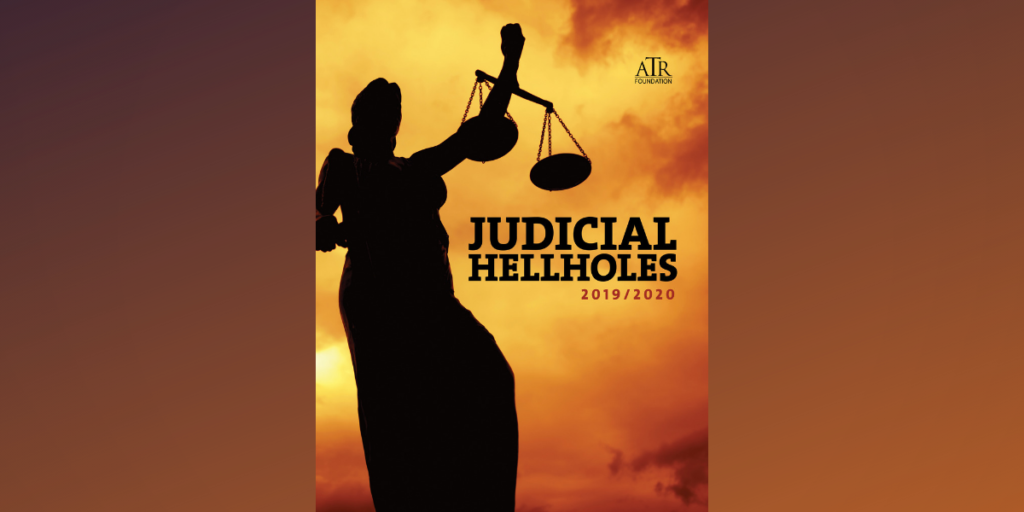Lawsuit Advertising Frenzy Fuels Georgia’s Litigation Epidemic
Law Firms Spent $168M+ on 2.2M Ads in Georgia

Judicial Hellholes Abuse Nation’s Civil Justice System Philadelphia’s Court of Common Pleas tops 2019-2020 list DECEMBER 10, 2019 (WASHINGTON) – A new report highlights the worst local courts and states […]
Judicial Hellholes Abuse Nation’s Civil Justice System
Philadelphia’s Court of Common Pleas tops 2019-2020 list
DECEMBER 10, 2019 (WASHINGTON) – A new report highlights the worst local courts and states for abuses of the civil justice system, with the Top 10 Judicial Hellholes filled with widespread civil lawsuits, legislative loopholes that create more ways for lawyers to sue, and judges who allow junk science into evidence in trials.
The 2019-2020 Judicial Hellholes report of the American Tort Reform Foundation shines a light on the year’s abuses in the civil justice system and in state legislative bodies, lists areas on the cusp of becoming a Judicial Hellhole and identifies several troubling legal trends that are emerging.
“Justice is abused in these Judicial Hellholes, with abuses in the civil justice system hurting businesses, consumers and the nation,” said Tiger Joyce, ATRF president. “Litigation abuse drives up insurance costs and drives away jobs, and the money businesses spend fighting often-frivolous lawsuits takes dollars away from research and development of new consumer products.”
The 2019-20 Judicial Hellholes report ranks Philadelphia’s Court of Common Pleas as the No. 1 Judicial Hellhole in the country, due to the large number of mass torts cases inundating this court system and the high-dollar judgments and settlements that result. For example, in October, Johnson & Johnson was hit with an $8 billion verdict involving the medication, Risperdal, which reportedly is the largest verdict from the court in 25 years. The Philadelphia Court of Common Pleas’ Risperdal litigation has grown to nearly 7,000 cases – or approximately two-thirds of the court’s inventory. The court also has opened its door to plaintiffs from all over the country. Eight-six percent of the new pharmaceutical suits in Philadelphia are brought by out-of-state plaintiffs.
In March, Bayer and Johnson & Johnson agreed to settle more than 25,000 cases involving their jointly developed blood-thinning medication, Xarelto, for $775 million, despite an unblemished record in the courtroom. The litigation was largely divided between Philadelphia and Louisiana, another 2019-2020 Judicial Hellhole.
“What we’re seeing is that the merits of a lawsuit do not seem to matter much, if at all,” Joyce said. “The reality is the sheer volume of cases a defendant faces now drives corporate litigation strategy, with some finding it better to simply settle than fight so many cases.”
The 2019-2020 top Judicial Hellholes are:
“Our hope is that this report on Judicial Hellholes will be a loud wake-up call for government officials to stop the madness,” Joyce said. “Stop creating more ways for lawyers to sue businesses, stop wasting money in court, and stop contributing to job loss.”
Excessive tort costs result in hundreds of thousands of jobs lost and billions of dollars lost in personal income each year.
The report also spotlights additional courts and states that bear watching due to troubling developments: the Colorado Supreme Court, Florida, Maryland Legislature, Montana Supreme Court, Pennsylvania Supreme Court, South Carolina Asbestos Litigation and West Virginia Supreme Court.
“These locations are on the cusp of becoming full-blown Judicial Hellholes,” Joyce said.
“State leadership must take action and enact common-sense reforms before their economies pay the price.”
Report Flags Emerging Civil Litigation Trends
The 2019-2020 Judicial Hellholes report of the American Tort Reform Foundation also identifies several worrisome areas emerging in civil litigation including an increase in local governments filing local lawsuits to address national public policy issues, legislation seeking to ban arbitration and new data privacy liability concerns.
“National and global problems cannot be solved through litigation in local courts,” Joyce said.
View the full report and read more details at JudicialHellholes.org.
Law Firms Spent $168M+ on 2.2M Ads in Georgia
ATRA’s Latest Studies Reveal Financial Influence and Lack of Transparency in Pennsylvania’s Campaign Finance Systems
Two New Reports Analyze Legal Services Advertising Trends and Campaign Contributions
Two New Reports Unveil Disturbing Trends in Legal Services Advertising and Plaintiffs’ Firms’ Political Contributions
In-depth analysis unveils trial lawyers’ staggering advertising and political spending, exposing tactics used to shape public opinion and legal outcomes.
ATRA’s Latest Reports Reveal the Deep Ties Between Trial Lawyers and New York Politics